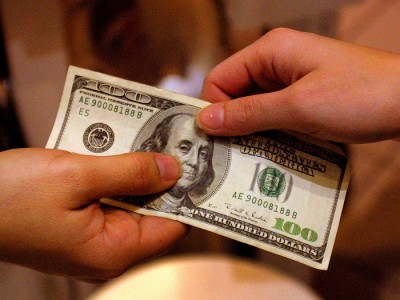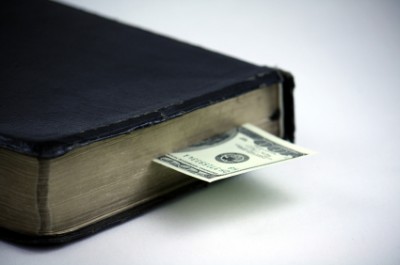As you can see, the fact of man’s evil nature bears
on both the positive and normative aspects of economics.
—Tom Rose, Economics: Principles and Policy (1996)
If we discard the law, we are left to wander aimlessly, with no basis for justice,
no means of recognizing it, and no principles with which to apply it.
—David Chilton, Productive Christians in an Age of Guilt-Manipulators (1988)

Image source: Connecticut.CBSlocal.com
Sin has profound economic consequences. Our collective fall into sin has left us self-centered and quite present-oriented. We are now, by nature, bent towards irresponsibility … that is … we will not naturally use God’s gifts and talents as we should. Some men will steal and hoard and seek to control the possession of others. Some will squander and waste the possessions they have and make no effort to produce more. All men seem to naturally want what isn’t theirs. Oppression, sloth, waste and theft are givens in a fallen world. We see it in the headlines each day.
God’s curse on sin likewise has serious economic consequences (Gen. 3:16-19). The curse even sets limits on our productivity. It guarantees a scarcity of food and forces sinful men to cooperate economically. In Paradise fruit was hanging from every tree … now the Earth gives up her fruit grudgingly. We must work by the sweat of our brow. We have to deal with thorns and thistles, sickness and death. We must bargain and trade with other sinful, grasping men in order to make a living. Even as greed, envy and fear at times pushes us apart, the need to trade for goods and services pulls us back together again. In this respect the curse is something of a backhanded blessing as well as an aspect of common grace.
Of course, sin even complicates trade. First, each man seeks his own interests, his own good, and often at the expense of the other party … sometimes, to his harm. Trade often falters because of suspicion and ill will. Second, many men deal falsely. Even in the old days it was common to put the best apples on top of the barrel or feed the cattle salt so it drank lots of water and weighed more at the time of sale. On the buyer side … some folks lie about their ability to pay, or they delay payment contrary to their promises. This, too, discourages trade. Third, we all know that some men rob and steal. They use force or cunning to take other people’s goods. Their victims have fewer goods to trade and may not have enough remaining capital to get back on their feet.
Civil Government
Because of these daily realities, God has ordained civil government and given it a measure of authority in the market place (Rom. 13:1-7). God’s law makes robbery, theft and fraud civil crimes, and it is the business of civil government to apply and enforce God’s laws against these crimes vigorously (Ex. 22:1-15; cf. Lev. 19:11-13). There are some transactions, however, that ought to be completely illegal. God’s law tells us that some goods and services are neither good nor true service: the work of the hit man, the prostitute, the slave-trader, and the idol-maker come to mind. In this respect, God’s law is not libertarian.

Image source: freemoneywisdom.com
Now notice that the function of civil government is primarily negative. God has given the State the power of the sword (Rom. 13:4). The sword represents deadly force. The civil government is not creative in any economic sense. It can’t produce economic goods and it shouldn’t try to provide consumer services. Should we really want someone holding a sword (or gun) to educate our children, supervise our medical care or see to our retirement? As far as Scripture is concerned, taxes ought to pay primarily for law enforcement and civil defense (Rom. 13:1-7). Those are the areas where deadly force (or the threat of it) has the best application.
Sinful man, however, tries to turn civil government itself into an agent of theft and fraud. Kings steal from their people and so do democracies and bureaucracies. Some theft is direct while some is more subtle. The State may simply take its citizens’ property, with or without some attempt at justification. The State may debase, dilute or inflate the nation’s money supply: this steals the value of everyone’s money, robs savings and complicates investment. Or the State may pass laws and regulations that interfere with its citizens’ ability to operate their businesses or transact business in the market freely.
The Free Market
Rarely will a man knowingly and willingly enter into an economic transaction in which he sees himself to be the loser, right upfront. A man trades grain for gold because, at the moment, he values the gold more than the grain. His trading partner accepts the grain and gives up his gold because he considers the grain more valuable, at least in that same moment. Each walks away from this transaction, convinced he is the winner. “It is naught, it is naught, saith the buyer: but when he is gone his way, then he boasteth” (Prov. 20:14). A lack of trust and good can slow down the process, but the natural scarcity of goods and our desire to have more than we currently have … has fostered trade quite well, even to an international level.
Limits on Civil Government
God does not give the State any authority to interfere with trade, local or international, beyond the limits we have already discussed. In fact, any attempt by the State to take, control or limit the use of its citizens’ property beyond the boundaries set in Scripture is itself theft. Within the limits of God’s law, it should be lawful for a man to use his property as he pleases (Matt. 20:15). This means that the use of eminent domain, wage and price controls, government subsidies to business, tariffs, corporate bailouts, inflation or debasement of the money supply, and government regulations that deliberately favor one party over another are all legalized theft and are illegal. Socialism, whether Marxist or Fascist (National Socialism), is simply institutionalized theft and inherently destructive.
In a fallen world, the best civil government, then, is a civil government that is severely limited in its function, decentralized in its structure, and bound by written law in its operation. That law must be the application and implementation of God’s law as it is found in Scripture. Any other law will be marred and twisted by man’s greed and selfishness. Of course, no law, not even God’s, can compel men to be honest or prevent civil rulers from stealing. That requires the grace of God in Jesus Christ. Only men who fear God have a good reason not to steal. It’s important to understand that our current economic realities … should always point us back to the Gospel.
For Further Reading:
Calvin Beisner, Prosperity and Poverty, The Compassionate Use of Resources in a World of Scarcity (Westchester, IL: Crossway Books, 1985).
Tom Rose, Economics: Principles and Policy from a Christian Perspective (Mercer, PA: American Enterprise Publications, 1996).
David Chilton, Productive Christians in an Age of Guilt Manipulators, A Biblical Response to Ronald J. Sider (Tyler, TX: Institute for Christian Economics, 1981).
Gary North, Honest Money, The Biblical Blueprint for Money and Banking (Ft. Worth, TX: Dominion Press; Nashville, TN: Thomas Nelson, Inc., 1986).
Gary North, Inherit the Earth, The Biblical Blueprint for Economics (Ft. Worth, TX: Dominion Press, 1986).
